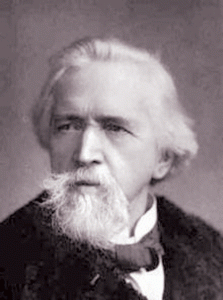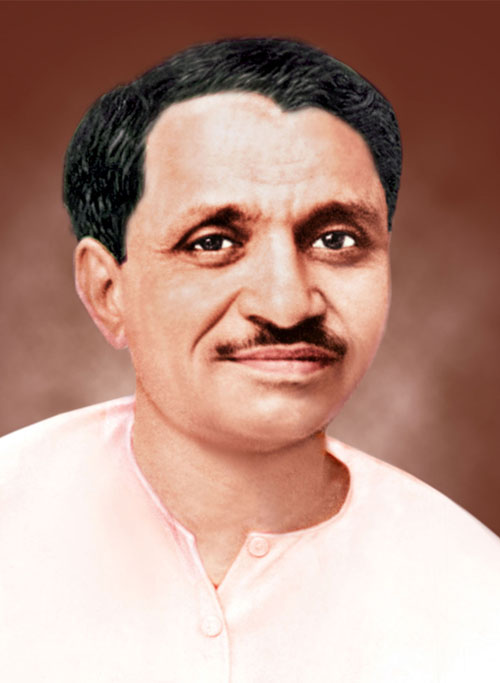(Continue from Last Issue….)
D.B. Thengdi
For this, it is necessary to change the current capitalist value-system, which debases both-the exploiter and these-plaited, demolish the structure of capitalism under which a worker no longer feels himself to be anything but an animal; and enable him to separate finally from the animal world, to leave the conditions of animal existentt behind him, and enter conditions which are really human. Being liberated from the bondage of material seeds man will cherish the vision of the ‘realm of freedom’ beyond which “begins that development of human power which is its own end.” Mr. H.S. Sinha has ably shown in his ‘Communism and the Gila’, that the inspiration of Marx was in ethics, and he used economics as his instrument.
But in his zeal to change the world -.instead of merely interpreting it, he allowed himself, as for as the solutions were conwrned, to be completely pre-occupied with the then current maladies of the industrialised west dominated by the inhuman capitalists and the anachronistic Church, and tried to generalise his conclusions which were part!y valid in the immediate context. Hence his error of judgement regarding the efficacy of the Western parliamentary democratic system, trade unionism and cooperative movement; capacity of capitalism to adjust itself with the changed level of mass consciousness; the role of proletariat; the potentialities of the peasantry; and the inherent strength of social organism, such as, nation and family. But for such lopsided pre¬occupations, Marx was certainly capable of giving a comprehensive thought to the problems of the entire humanity and working out solutions which could have been more universal in nature.
IV. INTEGRALISM
Deendayal ji did not suffer from any such inhibitions. As a leader of a national political party he was called upon to offer solutions to immediate national problems and he did it in a commendable way. But this role did not overshadow his thinking process in his evolution of the theory of Integral Humanism. Only a mind that attains universality can conceive of remidies tbat are universal in character. In fact, his comprehension was not confined to the human species. He expected human consciousness-without suffering from homocentricism. He had a vision of the world-state enriched by the growth and contribution of different national cultures, and of Morava Dharmo enriched by the perfection of all religions, including Marxism. He had realised that the identification of an individual with different organisms, ranging from family to the universe, was only an outward manifestation of the evolution of his consciousness.
The more developed the consciousness, the larger and higher would be the organism with which one is identified. But this being a process of subjective evolution, the higher level of consciousness does not pre- clude the previous lower levels. It is inclusive, not exausive,.in charaeter. One can be equally and simultaneously attached to all the organisms without doing injustice to anyone of them. This is an integral view of things. Every human being must be considered in an integrated way; the body, mind, intelligence and soul of a person must not be thought of as separate entities.
Integralism is the special characteristic of Panditji’s Humanism. While he appreciated the utility of appropriate socio-economic order in any scheme for human happiness, he laid greater stress on the moulding and development of human consciousness, in absence of which no social ordeal, howsoever meritorious, can yield its desired results. According to Marx, life is not determined by consciousness, but consciousness of men that determines their being, but on the contary, their social being that determines their consciousness. pandit ji, on the other hand, believed that while life or social being and consciousness act and react upon each other, it is consciousness that is more decisive. Intergralism and consequent stress on development of consciousness distinguish his approach from that of Marx.
For example, both- Marx and Pandit ji considered statelessness as an ideal condition of any society. Marx also considered the State as an expression of man’s selfalienation. But Because he considered mind as only a superstructure on matter, he conceived of the ‘dictatorship of the proletariat’ as the transitional phase. For Deendayal ji, the effective instrument was Dharma consciousness. The ideals of the nation constitute ‘Chiti’, which is analongous to the soul of an individual. The laws that help manifest and maintain Chiti of a nation are termed as Dharma of that nation implying that every social organism has its own Dharma.
V. The Two Approaches

Both of them were against exploitation and the system that gives rise to it, Pandit ji said:
“But one thing is clear, that many institutions will yield place to new ones. This will adversely affect those who have veste interests in the old institutions. Some others who are by nature averse to change will also suffer by efforts of reconstructions. But diseases must be treated with medicine- therefore, we shall have to discard the status quo mentality and usher in a new era. Indeed our effort at reconstruction need not be clouded by prejudice against, or disregard for, all that is inherited from our past. On the other hand, there is no need to cling to past institutions and traditions which have outlived their utility.
Marx advocated bloody revolution for destroying not only the superstructure but also the foudations of the existing social order; Pandit ji stood for mass awakening, mass education and mass mobilisation through appropriate sanskaras with a view to alter the superstructure, leaving intact the eternal foundation of Dharma.
Both these thinkers visualised full development of all the faculties of every individual. But while Deendayal ji considered man in an integrated way, Marx, under the influence of the then prevailing objective conditions, treated man as an economic being. In fact, Marx was against the power of money, against the sense of possession. He wanted man to be liberated from the lust for wealth and the bondage of economic factors. But, in practive, he emphasised mainly the economic aspect of human existence. This has caused lopsidedness in his theory.
Deendayal ji was a bitter critic of corruption and perversion in the field of religion. But he did not throw away the baby along with the bathwater. The Western tradition of anti-religious intellectuals and the nauseating picture of the Christain Church turned Marx against religion and he declared crusade against all religions about some of which he had no intimate knowledge.
Integral Humanism believes in the PffiralitY in the midst of a single mankind in the form of different national personalities. It simultaneously believes that internationalism n the outward manifestation of the development of human consciousness from the earlier stage .1 nationalism. Marxism is the embodiment of notional nihilism.
‘The proletariat has no father-land’. According to Lenin, “Socialism’s aim M not only to abolish the fragmenta-tion of only into small states and to end all distinctions between nations, not only to bring the nations closer together but to bring about fusion”. This is based upon the ignorance of the This strength of the nation-concept. Let O be remem-bered that nationalism has always been strong even in countries under communist governments. It has been the case even during periods of actual communist revolution.
It isa shallow view of Russian history which sees Bolshevism as an alien excre-scence grafted on the Russian body politic by a handful of poweggsting conspirators without roots in the past. The triumph of the Bolshevik Revolution was no once inevitable; but Bolshevism as a movement was an indegenous, authoritarian response to the environment of Tsarist absolutism which nurtured it.” “Chinese Communism” Malcolm D. Kennedy observe “is a child of Chinese Nationalism, which means a determination to shake off foreign dominotion.” This also holds good for Communism in Vietnam and other developing countries. (To be continued…)
(The writer was an eminent thinker &
Founder-General Secretary of Bharatiya Mazdoor Sangh)


